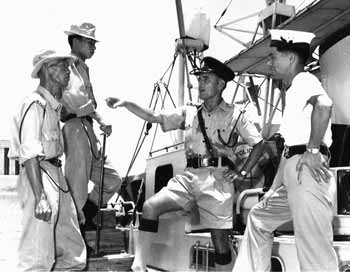The Chinese saying "when the hills are high the Emperor is far away" refers to the joys of an independent command far from one's seniors. It could have been coined for the Marine island stations between the 1940s and the 1980s, and one can sense that hackneyed phrase `the happiest days of my life' once again hovering around waiting to be uttered whenever Mariners talk of their time there. Roads, telephones, mains power and even flushing toilets all arrived in the islands comparatively late, and this added to the somewhat surreal air that obtained. Time almost literally stood still there, and although the twentieth century ultimately forced its way in it was a comparatively slow process. There were also purely practical reasons for liking the islands, as Wong Ngok found when he was posted to Tai O in 1958:

Of course, there were those who found the comparative isolation more difficult to handle than others. Constables - and inspectors - sometimes got involved with local girls, which could lead to situations that required careful handling. Some European officers found the cultural isolation too much and turned to the bottle but the majority, most of whom were in their mid-twenties, revelled in the chance to be part of a unique and totally fascinating circumstance.
There was also room for a little mild eccentricity. Some set out to write novels or took up strange musical instruments, while others organised local football leagues or learnt to crack a stockwhip. At least one bred an ever-expanding range of livestock, while another had a pet pig. Mike Illingworth had a spell at Tai O in 1952:
"Years later when I was DS/Marine I got a complaint from the Public Works Department that there were lots of holes in the lamps - I wrote a snotty note to the OC saying `you must not shoot holes in the perimeter lamps...'"
.22 rifles were not the only weapons available to bored inspectors in the islands however; there were cannons as well. These, in all shapes and sizes, came from fishing and trading junks which until the 1940s were legally permitted to carry a wide variety of weapons as protection against pirates. Some of the cannons they had carried were genuinely historic, and these mostly ended up in museums or mounted outside government offices. Others were passed on to be mounted on parade grounds or outside police messes, but so many were handed in during the 1950s and 60s that some of the stations literally had piles of them.
It was inevitable that someone should `have a go' at firing one of them sooner or later, and as far as is known the first attempt was in late 1952. The firer, as Mike Illingworth later recalled, had been sent to Tai O to relieve him for a few days:
"It was a couple of weeks after this that this chap decided to fire his cannon... He bunged it full of explosives, got stones and things rammed in - did everything correctly but forgot one thing. Everyone retreated to a safe distance, and there was this roar from the cannon. The stones shot out to seaward - it was a good job no-one was coming round the point - and the cannon, they having forgotten that it was loose on its trolley, flew back against the wall and brought down all the work that had been done by the PWD!"